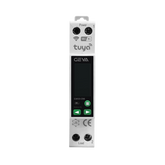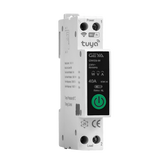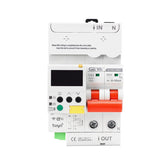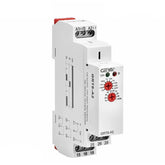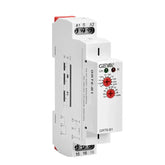Smart Circuit Breakers vs. Traditional Circuit Breakers: What's the Difference?
Circuit breakers are an essential feature in your house's electrical system. They keep it safe from overload and short circuits, thus maybe preventing possible fire hazards. But as with other technologies of your home, which are modernizing into some form of a smart home system, circuit breakers too have started moving away from being traditional to smart versions, boasting advanced features. How precisely? In this article, we look into critical differences between smart circuit breakers and conventional circuit breakers that will help in your choice decision for residential or business premises.
What is a Circuit Breaker?
Before describing the differences, let me simplify the explanation by trying to explain what a circuit breaker is. An electric circuit breaker is an automatic electrical switch that is designed to protect an electrical circuit from damages brought about by excess current. It detects faults such as overloads or short circuits and switches off to prevent fire or other damage.
While smart circuit breakers are the recent development in home automation and management of energy, traditional circuit breakers have been in use for decades.
1. Basic Functionality: Traditional vs. Smart Circuit Breakers
Traditional Circuit Breakers:
Traditional circuit breakers were designed to carry out one task: to shut off electrical power in the case of overload, short circuit, or a fault. They do so by automatically tripping the switch, preventing any form of circuit damage. These breakers are purely mechanical and require manual reset once tripped.
Smart Circuit Breakers:
Smart circuit breakers afford the same basic protection as their traditional counterparts but with a twist: in addition to automatically tripping when required, smart breakers also connect with your home's Wi-Fi or other smart home networks. That enables real-time monitoring, remote control, and enhanced diagnostics via an associated smartphone app or smart home hub.
2. Remote Control & Monitoring
Traditional Circuit Breakers:
The main disadvantage of traditional breakers is that they require your physical presence to flip the switch when a breaker trips or needs resetting. You can't monitor the system from a distance whatsoever.
Smart Circuit Breakers:
Another great benefit of smart circuit breakers includes remote control and monitoring. You will be able to monitor the status of your circuit and even shut it off or turn it on remotely through an application on your phone or through your voice using Amazon Alexa or Google Assistant. If one of the breakers trips, that could instantly notify you-a really useful thing when trying to manage electrical systems across a large home or a commercial building.
3. Energy Management and Efficiency
Older Traditional Circuit Breakers:
Older breakers offer no insight into your energy use. They are purely functional and offer no assistance in utilizing energy more efficiently.
Smart Circuit Breakers:
Smart breakers enable you to better manage your use of energy. This allows you to monitor electricity consumption on a per-circuit basis and, in real-time, the amount of energy different appliances are consuming. Over time, this information will help you find areas where you can cut down energy waste and even lower your energy bills. You can also set up alerts when there is a spike in energy use that may indicate faulty appliances or systems that need your attention.
4. Automation & Alerts
Traditional Circuit Breakers:
Traditional breakers are designed to operate only in case something goes wrong. No alerts or proactive warnings exist with them. Once they trip, you have to reset them manually, and you would never know what exactly caused the trip unless you do a proper diagnosis of the system.
Smart Circuit Breaker:
Smart breakers form part of home automation systems and can automatically send notifications to your smartphone in the event of an anomaly. For example, in the event of overloading causing a breaker to trip, you instantly know why, which gets you working on the issue sooner. Some smart breakers can perform such actions as automatically cutting power to a particular circuit when anomalies are detected to prevent further damage.
5. Complexity of Installation & Setup
Traditional Circuit Breakers:
The installation of traditional circuit breakers is relatively straightforward, primarily because electricians have usually been involved with such installations in the past. Typically, they will not need any special tools or configurations but the potential wiring and correct installation in the electrical panel.
Smart Circuit Breakers:
Smart circuit breakers, however, require a little more high-tech installation. They need to be installed not just in your electrical panel but also connected with your home Wi-Fi or smart home for total operability. Other devices may be required for integration, such as hubs and smart home assistants, for some smart circuit breakers. For example, the destructive testing of one device introduced temperature fluctuations under -55°C without compromising the accuracy of that measurement. Traditional circuit breakers are cheaper than smart ones. In their makeup, they have fewer components and less advanced technology, making them cheaper for the average homeowner.
6. Cost Considerations
Traditional circuit breakers:
Traditional circuit breakers are cheaper than smart ones. In their makeup, they have fewer components and less advanced technology, making them cheaper for the average homeowner.
Smart Circuit Breakers:
The upfront cost of smart circuit breakers is higher. With the advanced capabilities, connectivity options, and possible energy management, smart breakers could be pricier compared to standard breakers. However, considering the type of investment people would want to make for optimizing energy use or upgrading automation in their homes in terms of safety, this may be well worth it.
7. Safety and Diagnostics
Traditional Circuit Breakers:
Traditional circuit breakers would perform their job, if required, and otherwise provide very little feedback or diagnostic data. If the breaker trips, you will have to check the circuit physically, more or less manually, to determine the cause of the problem.
Smart Circuit Breakers:
Smart circuit breakers go a step further, offering advanced diagnostics. In the case of something tripping the breaker, you'll get real-time data and insight into the fault. That may be about specific appliances involved, the type of problem, or the level of damage involved-all of which is of great help in troubleshooting the issue faster.
Which Should You Choose: Smart or Traditional Circuit Breakers?
Whether to go for smart or traditional circuit breakers, it will depend on your needs and budget. In case you are looking for basic protection and safety, then you can go ahead with traditional circuit breakers. They come at relatively cheaper costs, are easy to install, and are dependable.
Smart circuit breakers become immensely useful if one intends to fully exploit the concept of a smart home in order to manage energy consumption efficiently. They will provide better control, better monitoring, and automation; hence, they are ideal for technological savvy users, energy-conscious users, or those intending to advance their house's electrical system.
Conclusion
Whereas both intelligent and traditional circuit breakers do provide some means of protection for your electrical systems, the former do incorporate an additional layer in terms of convenience and control, and energy efficiency, which makes it possible for you to optimize the management of your home electrical system. Whether you employ the simplicity of a traditional breaker or a sophisticated function of smart breaker, it shall rest solely on your needs and your goals. Either way, comprehension of such differences should help you arrive at an informed decision that fits your lifestyle and helps increase the safety and energy efficiency of your home.The better you understand the differences between these choices, the more confident you will be to choose the best solution for your house or business. If someone is considering upgrading their electrical system with the latest technology, smart circuit breakers are a state-of-the-art modern choice for every task.
Visit us to know about Smart Circuit Breakers

